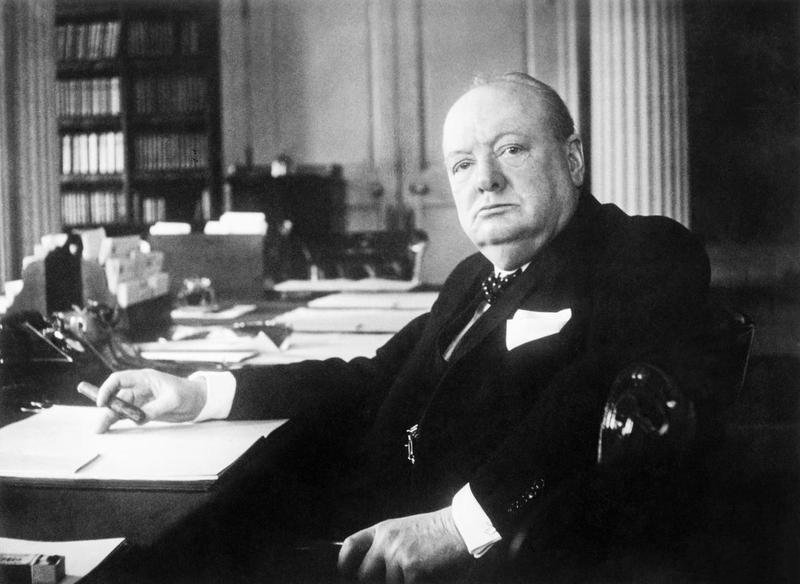Portrait of Prime Minister Winston Churchill at his seat in the Cabinet Room at No. 10 Downing Street, London ca. File Photo courtesy Cecil Beaton/Imperial War Museums
LONDON, May 10, 1940 (UP) - Prime Minister Neville Chamberlain resigned tonight and Winston Churchill agreed to form a new government.
The new government - it was agreed without exception - shall be one of national unity in which Labor, Liberals and Conservatives alike join to meet the threat of the dread German blitzkrieg.
The change of government was being accomplished in record-breaking speed for the ordinarily slow and traditionally form-bound British parliamentary system. Only this morning it generally was believed that despite the unleashing of the German attack on the low countries and the imminent threat to the British Isles that it would be 10 days or a fortnight before a new government might be formed.
But sudden conferences were held. The Labor Party agreed to go into the government if Chamberlain quit. Within a few hours the preliminaries that will give Britain a new, virile war leader had been accomplished.
At three minutes before 6 p.m. Chamberlain appeared at Buckingham Palace. At 6:25 p.m. he emerged, to be followed immediately by Churchill. It now was evident that the change had been made - Chamberlain out, Churchill in.
It is the first time in a career devoted to politics - most of it in the spotlight - that Churchill has headed a government. Technically, he is not yet head of a government, but none in London doubted that he would be able to enlist the necessary support to achieve a cabinet of national unity. Had not this been evident, it was regarded as certain that Chamberlain would have deferred his resignation.
What the makeup of the new government will be was not yet known, but it was expected to include David Lloyd George, Britain's war prime minister and veteran Liberal. Lloyd George, it was said, will become a minister without portfolio. Several Laborites will enter the cabinet, it was agreed, but which members of the party they will be and what their posts will be were not immediately certain.
For the time being - until all formalities are out of the way - the present ministers will remain at their posts. That is to insure continuity of office so that the country will not be without responsible ministers in case of strokes by the German war machine.
In addition to Lloyd George, the new cabinet members are expected to include Sir Archibald Sinclair, Liberal leader, and Maj. Clement Atlee and Herbert Morrison, Laborites.
Whether Sir John Simon and Sir Samuel Hoare, Chamberlain's closest personal friends and political associates, will remain in office was not known, but it was believed that they would follow their leader out of office.
Developments included:
1. Utmost military aid - chiefly by the British Air Force and troops in northeastern France - was rushed to the Netherlands and Belgium.
2. Britain prepared against the expected German air attack in force on the British Isles.
3. First German bombs were dropped on a British town near Canterbury.
4. Emergency stand-by orders went out in preparation for the possible evacuation of 400,000 to 500,000 London children.
5. Troops were stationed at all vital points in the British Isles - railway terminals, power stations and the like - with orders to fire on any "fifth column" attempts at sabotage.
6. Iceland was occupied by a British force as a protective measure against possible German attempts to seize it as a base.
Preparations to evacuate London's children were inspired by the fear of imminent bombings. Despite the evacuation of 250,000 children from the metropolitan area at the outbreak of war, the youngsters have filtered back until now it is estimated that 400,000 to 500,000 will have to be removed. Volunteer workers were appealed to for aid in the task which, it was estimated, will require six days after it is ordered.
All R.A.F. leaves were canceled to bring the air force to full fighting strength for its duties in the low countries and in combatting attacks on England itself.
Government workers were recalled from their Whitsuntide holidays.
The public was urged to use railways and other transport means as little as possible to free these facilities for military uses.
British authorities denied reports broadcast by the Spanish radio and picked up in Buenos Aires that the Mediterranean had been closed at Gibraltar.
Lloyds announced that war risk rates on voyages to and from Holland had been doubled and that a heavy increase in rates for the Mediterranean and Black Sea was in force, bringing the rate to 100 shillings per 100 pounds, compared with 60 shillings previously. Rates on shipping from southern France to Algeria were doubled.
Sir John Anderson, minister of home defense, warned the public that "we must all be prepared to carry gas masks from now on."















